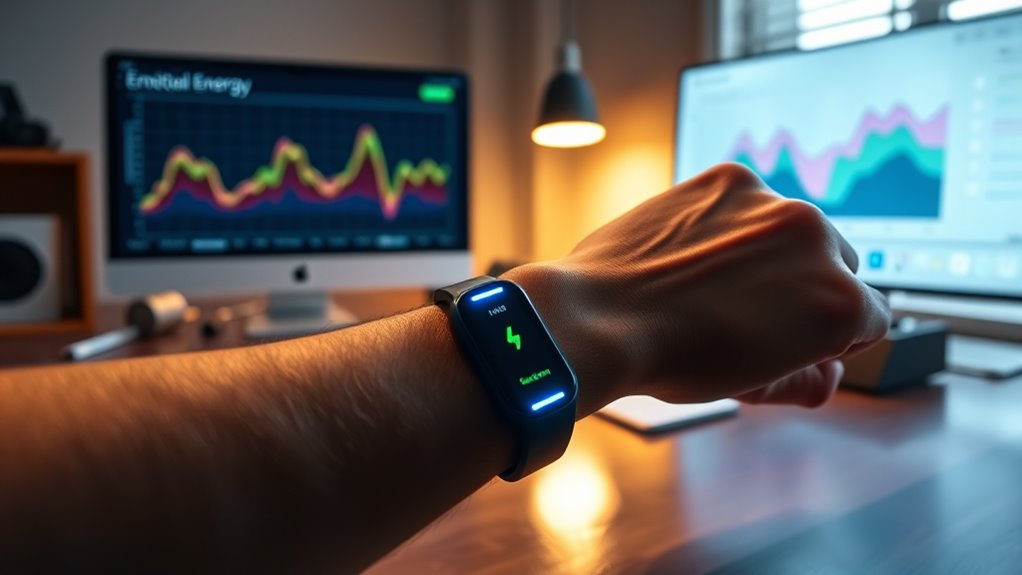Quantified Self 2.0 helps you track your emotional energy using wearable devices, mood journals, and AI analytics to get detailed insights into your mental resilience. By recognizing patterns and triggers, you can optimize your schedule and activities for better emotional balance. This approach boosts your resilience, focus, and overall well-being. As you explore this further, you’ll discover how to turn emotional data into actionable steps for peak performance.
Key Takeaways
- Integrates wearable and app-based tools to monitor real-time emotional states and identify mood patterns.
- Analyzes environmental and behavioral triggers affecting emotional energy and resilience.
- Uses AI-driven insights to predict emotional dips and optimize activity scheduling.
- Guides personalized strategies for emotional recovery, stress management, and mental resilience.
- Enhances overall well-being and performance by transforming emotional data into actionable insights.

In the evolving landscape of self-tracking, Quantified Self 2.0 represents a new era where technology seamlessly integrates into your daily life to provide deeper insights. Instead of just monitoring steps or calories, it now focuses on understanding your emotional energy and mental resilience. This shift allows you to optimize not only your physical health but also your mental well-being, giving you a more holistic approach to personal performance. With advanced emotional analytics, you can track subtle fluctuations in your mood, stress levels, and overall emotional state, helping you identify patterns and triggers that influence your mental resilience over time. By leveraging wearable devices, mood journaling apps, and AI-driven insights, you gain a well-rounded view of how various factors—like workload, sleep, social interactions, or even diet—affect your emotional landscape.
As you collect emotional data, you start to see the bigger picture of how your mental resilience fluctuates across different contexts. For example, you may notice that certain times of day or specific environments tend to drain your emotional energy, while others boost it. Recognizing these patterns empowers you to make smarter decisions—such as scheduling demanding tasks when your emotional energy is high or incorporating relaxation techniques during stressful periods. Quantified Self 2.0 tools go beyond raw data, providing actionable insights that help you build emotional intelligence and resilience. You learn to anticipate emotional dips before they happen, giving you the chance to proactively manage your mental state rather than reactively coping with it.
Tracking emotional energy also enhances your capacity for mental resilience by revealing what activities or habits replenish your emotional reserves. Whether it’s a quick walk, a meditation session, or social connection, these insights help you craft a personalized resilience plan. Over time, you develop a better understanding of how to maintain emotional balance, which translates into improved focus, motivation, and overall performance. This technology-driven approach makes resilience measurable and manageable, turning abstract concepts into tangible metrics. As you refine your emotional analytics, you become more adept at balancing stress and recovery, ultimately strengthening your mental resilience. Furthermore, understanding the emotional landscape of your daily life can help you foster better relationships and improve your overall well-being. The integration of these tools transforms how you approach personal growth, making resilience an active, ongoing process rather than a reactive struggle. In this way, Quantified Self 2.0 doesn’t just track your emotional energy; it helps you optimize it, making peak performance an achievable, sustainable goal.
Frequently Asked Questions
How Accurate Are Emotional Energy Tracking Devices?
You might wonder how accurate emotional energy tracking devices are. Their accuracy depends on sensor calibration and data reliability. Proper calibration guarantees sensors accurately detect physiological signals related to emotions, but variations can affect results. While these devices can provide useful insights, they’re not foolproof. You should interpret their data cautiously and consider them as complementary tools rather than definitive measures of your emotional energy.
Can Emotional Energy Metrics Predict Burnout?
Think of emotional energy metrics as your mental fuel gauge. If you ignore it, you risk burnout, just like a car runs out of gas unexpectedly. Tracking these metrics helps you build emotional resilience and manage stress better. By noticing early signs of depletion, you can take proactive steps to prevent burnout, ensuring you stay energized and focused. Yes, these metrics can predict burnout if used consistently and thoughtfully.
What Privacy Concerns Exist With Emotional Data Collection?
When collecting emotional data, privacy concerns arise because your sensitive information could be misused or shared without your consent. To protect your privacy, organizations should implement data anonymization, ensuring your identity remains confidential. Additionally, clear consent management is essential, so you control what data is collected and how it’s used. This way, you maintain trust while benefiting from emotional insights, without risking privacy breaches.
How Do Cultural Differences Affect Emotional Energy Measurement?
Have you ever wondered how cultural differences influence emotional energy measurement? Cross-cultural perceptions and emotional expression norms shape how you interpret and report your feelings. In some cultures, expressing emotions openly is encouraged, while others favor restraint. These variations can impact data accuracy and insights, making it essential to contemplate cultural context when tracking emotional energy. Are you prepared to account for these differences in your emotional analytics approach?
Are There Any Health Risks From Prolonged Emotional Tracking?
Prolonged emotional tracking can lead to emotional fatigue, where you feel drained or overwhelmed, and may even cause increased stress levels. Additionally, you should be mindful of data security, as sensitive emotional data could be vulnerable to breaches if not properly protected. Continuously monitoring your emotions might inadvertently amplify negative feelings or cause privacy concerns, so it’s essential to balance tracking with self-care and secure data practices.
Conclusion
By embracing the evolution of the Quantified Self, you empower your emotional energy to excel. Tracking triggers, tuning into tides, and tailoring tactics transform your daily discipline. As you harness habits and hone habits, you heighten happiness and health. Remember, this journey isn’t just about data—it’s about deliberate, dynamic self-discovery. Immerse yourself in this daring domain, and discover the dynamic difference data-driven decisions make in your quest for peak performance.









